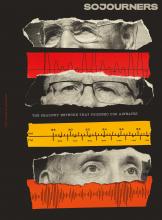IN EARLY MARCH, as part of a weekend of events in Selma, Ala., to commemorate the 55th anniversary of “Bloody Sunday,” MSNBC’s Joy Reid and DNR Studios’ Mark Thompson moderated conversations with presidential candidates. When Elizabeth Warren took the stage, the racially mixed audience roared, many attendees holding signs in the air that read “Warren for President.”
Many black women activists, advocates, and leaders endorsed Warren early in the race for the 2020 Democratic presidential nomination. Black Womxn For, a coalition of more than 100 black women influencers, endorsed her in late 2019. I endorsed her in February 2020, as did Black Lives Matter co-founders Alicia Garza and Patrisse Cullors. At the Samuel DeWitt Proctor Conference, the premiere annual gathering of justice-minded black clergy, her name buzzed in hallways and around dinner tables. She had listened deeply to the African American community and many other marginalized communities, and the result was a deeply intersectional platform.
So, when Super Tuesday came, I was hopeful that black women across the South would go to the polls with enthusiasm for Warren. But overall, they didn’t. Joe Biden won the black vote throughout the South. What happened?
Read the Full Article

